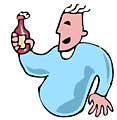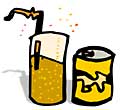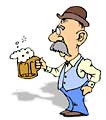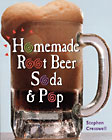|
|
 Root Beer: Have Some, My Dear Root Beer: Have Some, My Dear
by Marjorie Dorfman
Besides the hot dog, the hamburger and maybe apple pie, there’s nothing more American than root beer. But where did this strange drink come from and what does it want from us? Read on for some answers and if you get thirsty, you know what to do.
|
Still, carbonated waters run deep. – The Dorfman Archives
Root beer, like many blondes, has telltale darker roots. There are a variety of plausible stories surrounding its origins, although none can be proven. (The origins of blondes are far less shaky). So take a bit from column A and a smidgen from column B, and perhaps therein lies the truth about where this beverage really came from. One thing is certain. Root beer is an original creation, predating sodas and other colas. There is no one authentic recipe, as there are so many different combinations and brews. Over time, the drink has contained almost everything but the kitchen sink (and who knows if someone didn’t actually make a brew out of what they found in that)! Ingredients like allspice, birch bark, coriander seed, ginger and ginger root, hops, burdock root, dandelion root, spicewood, wild cherry bark and bitters, wintergreen, wintergreen oil and even molasses have all been utilized at one time or another. Some recipes did not use roots, or relied mainly on one ingredient. That’s where Birch Beer and Sarsaparilla Soda came from.
 In Medieval Europe, the lack of proper sanitation rendered well water unhealthy and unfit to drink. One legend tells of St. Arnold of Belgium, a monk, scientist and sort of lone ranger Ralph Nader, who studied why the rich people of his time lived longer than poor people. He discovered it was because they drank beer and wine instead of water and began a tradition of monastic beer brewing which continues to this day. There are historical British documents in which William Shakespeare himself is noted to have drunk "small beers." This European brew, actually made from an early Colonial American recipe, contained 2-1/2% alcohol, and was considered a light social drink made from herbs, berries and bark. At this time in history there were three basic categories; regular beer which was similar in alcohol strength to today’s beers, strong beer and small beer in which root beer most probably has its beginnings. In Medieval Europe, the lack of proper sanitation rendered well water unhealthy and unfit to drink. One legend tells of St. Arnold of Belgium, a monk, scientist and sort of lone ranger Ralph Nader, who studied why the rich people of his time lived longer than poor people. He discovered it was because they drank beer and wine instead of water and began a tradition of monastic beer brewing which continues to this day. There are historical British documents in which William Shakespeare himself is noted to have drunk "small beers." This European brew, actually made from an early Colonial American recipe, contained 2-1/2% alcohol, and was considered a light social drink made from herbs, berries and bark. At this time in history there were three basic categories; regular beer which was similar in alcohol strength to today’s beers, strong beer and small beer in which root beer most probably has its beginnings.
The early American colonists built towns and breweries as well, but most bread baking and brewing beer was done at home. They did not have crops of barley or other grains and had to rely on other sweeteners such as honey, molasses and cane sugar. There were no hops for bitterness and while experimenting with which plants in the New World would provide this, root beer was born into American culture, a healthy bouncing baby beverage of considerable weight and promise. During this period other beverages were also introduced, like Birch Beer, Sarsaparilla Beer and Ginger Beer. For some reason, only root beer would emerge as a long time American favorite.
 Most historians believe that the invention of root beer happened like penicillin, that is, by accident. In 1870, an unknown pharmacist toying with a handful of roots, berries and herbs, invented a recipe for root beer which consisted of juniper, wintergreen, spikenard, pipsissewa, (wha?), sarsaparilla, vanilla beans, hops, dog grass, birch bark and licorice. The original drink was quite medicinal in nature, tasting both bitter and sweet. Even though the pharmacist offered the drink to the public as an "elixir," it was never marketed or well received. (Perhaps he would have fared better peddling it to others besides his friends and relatives who didn’t believe a word he said.) Most historians believe that the invention of root beer happened like penicillin, that is, by accident. In 1870, an unknown pharmacist toying with a handful of roots, berries and herbs, invented a recipe for root beer which consisted of juniper, wintergreen, spikenard, pipsissewa, (wha?), sarsaparilla, vanilla beans, hops, dog grass, birch bark and licorice. The original drink was quite medicinal in nature, tasting both bitter and sweet. Even though the pharmacist offered the drink to the public as an "elixir," it was never marketed or well received. (Perhaps he would have fared better peddling it to others besides his friends and relatives who didn’t believe a word he said.)
In 1767 in England, Dr. Joseph Priestly invented a way to create carbonated water artificially. The result was considered healthful and as new inventors fine-tuned the production process, bottled carbonated water gained wider distribution and popularity. Soon people began to flavor the bottled bubbly water, creating a taste similar to our flavored carbonated waters of today. This was the birth not of the blues, but of the soda industry, as we now know it. Enter stage left, Mr. Charles Hires, a Philadelphia pharmacist and brilliant entrepreneur who was rumored to have the ability to bottle sunshine and sell it to Floridians!
Mr. Hires was the first to commercially bottle root beer. The whole truth to his success story is as clouded as early root beer was, but the most popular legend tells of his honeymoon on a farm in New Jersey where the landlady served the couple her magnificent home made herb tea. Somehow young Charles persuaded his hostess to part with her recipe which called for 26 roots, berries and herbs and was very similar to an old Native American recipe. He then packaged it and began to sell the mix, now called Hires Herb Tea, at his very own pharmacy. He also sold the tea at the 1876 Philadelphia Centennial Exposition. Hires Herb Tea was an instant hit with housewives who only had to boil the ingredients, strain them and add sugar instead of going out to gather the roots, barks, berries and occasional rosebuds as they may have found them.

|
|
|
|
 |
|
|
 "I come from a family where gravy is considered a beverage."
"I come from a family where gravy is considered a beverage."
Erma Bombeck
"The cold truth is that family dinners are more often than not an ordeal of nervous indigestion, preceded by hidden resentment and ennui and accompanied by psychosomatic jitters."
M.F.K. Fisher
|
Don't miss this excellent book:
Homemade Root Beer, Soda and Pop
by Stephen Edward Creswell

From soda water to sarsaparilla, this book offers easy-to-follow instructions for more than 60 traditional and modern soft drink recipes. Learn to make your own drinks, which are tastier, healthier and cheaper than anything found in stores! Fascinating stuff for anyone interested in how everyday things like soda pop evolved to become the things we take for granted today.
|

Click for a printer friendly version of this article.
|
|